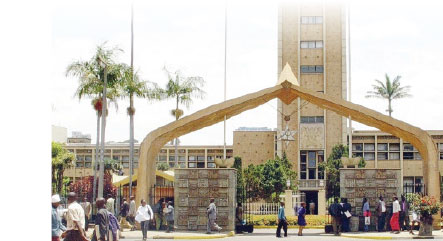 |
|
A crucial parliamentary committee has painted a sorry picture of the state of public spending in the counties. (Photo: Standard/File) |
By JACKSON OKOTH
Kenya: A crucial parliamentary committee has painted a sorry picture of the state of public spending in the counties at a time when the National Assembly is getting ready to prepare the budget for the next financial year.
The Budget and Appropriations Committee has noted that most of the counties are living beyond their means; that many of them have no idea how to budget; and that they are not even ready to absorb the billions that the National Treasury sends to the counties.
The MPs’ report on the Budget Policy Statement has also slammed counties for having very huge workforce.
The levies and fees that county governments have imposed as they seek money to deliver services are also stifling business in the counties, the MPs said in their report tabled in the National Assembly late Thursday.
The dim view of the county government’s fiscal management gives credence to efforts of the Executive and the Legislature to paint devolution in bad light and swing the public mood against the devolved units, a perfect scenario that can be used to engineer an amendment to the Constitution to quash devolution.
The House committee has noted that most of the problems arose in the early months of devolution, mainly due to hurried budgeting in the counties, delayed and haphazard transfer of functions, as well as capacity problems in planning and budgeting itself.
The shocking verdict comes at a time when senators and governors are in a tussle over who calls the shots at the County Government level, with National Assembly caught up in the middle of this nasty dogfight.
“The transition to devolved government has been plagued with a number of fiscal challenges in its implementation phase. Most County Governments have rushed budgets that were poorly prepared and not anchored on development strategies,” the committee said in its report signed by the chairman Mutava Musyimi.
Local authorities
The 51-member committee has warned that a close look at the budgets of most of the counties raise doubts about their sustainability.
“There is a large recurrent spending associated with inherited workforce from the national government as well as defunct local authorities,” said Musyimi. But as the lawmakers painted a bad picture for the governors and the elected officials at the counties, they found a way to sneak in Sh5 million for themselves to use to complete the construction of the Centres of Excellence. In its recommendations, the Budget and Appropriations Committee insists that revenue allocations to the counties should be at least 15 per cent of revenue raised by the national government.
“Ideally, revenue allocations should be based on costing of functions and needs of each level of government. This has not been done making it difficult to determine what should be set for counties,” said the MPs.
When County Governments drew their budgets for 2013/14, the office of Controller of Budget had to disqualify some of them, causing disruptions in flow of funds to devolved units as those affected rushed back to the drawing board.
Also sticking out like a sore thumb is a bloated workforce in most counties as County Public Service Boards recruit staff that have similar competencies to those seconded from the national government.
In the past weeks, there has been an upsurge in cases of violent protests and demonstrations in several County Governments. This follows loud resistance to attempts by these devolved units to introduce all manner of levies and fees-drawing angry reactions from the public.
Just this week in Kakamega, traders protested over new charges for business permits. In Nairobi, angry touts and matatu drivers barricaded roads for hours on Wednesday complaining about new levies that the county government had approved.
In Nairobi, Governor Evans Kidero engaged in a game of wits with an organised group of taxi and matatu operators. The Nairobi County Government had increased parking fees for car parked within the city centre.
“There is a proliferation of county level taxes, fees and licenses, which are likely to increase the cost of doing business thereby hampering economic activity,” said Musyimi.
The committee notes that initial transitional issues delayed enactment of the County Allocation of Revenue Act. This had a negative impact on operations of Counties with most relying on the national government for months to pay wages for county employees.
“ There is need for clear guidelines from the Treasury and the forthcoming budget on what County Governments should charge in levies, fees and taxes so as not to increase cost of doing business,” Jackline Mugo, Federation of Kenya Employers (FKE) chief executive said.
 The Standard Group Plc is a multi-media organization with investments in media
platforms spanning newspaper print operations, television, radio broadcasting,
digital and online services. The Standard Group is recognized as a leading
multi-media house in Kenya with a key influence in matters of national and
international interest.
The Standard Group Plc is a multi-media organization with investments in media
platforms spanning newspaper print operations, television, radio broadcasting,
digital and online services. The Standard Group is recognized as a leading
multi-media house in Kenya with a key influence in matters of national and
international interest.
 The Standard Group Plc is a multi-media organization with investments in media
platforms spanning newspaper print operations, television, radio broadcasting,
digital and online services. The Standard Group is recognized as a leading
multi-media house in Kenya with a key influence in matters of national and
international interest.
The Standard Group Plc is a multi-media organization with investments in media
platforms spanning newspaper print operations, television, radio broadcasting,
digital and online services. The Standard Group is recognized as a leading
multi-media house in Kenya with a key influence in matters of national and
international interest.










